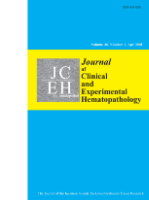
Journal of Clinical and Experimental Hematopathology
Scope & Guideline
Illuminating Pathways in Hematologic Science.
Introduction
Aims and Scopes
- Hematologic Malignancies Research:
The journal emphasizes research on various hematologic malignancies, including lymphomas, leukemias, and plasma cell disorders. It covers both clinical and experimental studies that contribute to the understanding of these diseases. - Clinical Case Reports and Reviews:
A significant portion of the journal includes case reports and literature reviews that provide insights into rare and complex cases, thereby enhancing clinical knowledge and guiding treatment strategies. - Pathological Insights and Diagnostics:
The journal highlights the importance of pathology in diagnosing hematologic disorders. It publishes studies focusing on histopathological evaluations, immunohistochemistry, and molecular techniques that assist in accurate diagnosis. - Therapeutic Advances and Clinical Trials:
Research on new therapeutic approaches, including novel drug treatments and clinical trial outcomes, is a core focus. The journal aims to disseminate findings that can influence treatment protocols and improve patient outcomes. - Tumor Microenvironment and Immune Response:
There is a growing emphasis on the role of the tumor microenvironment and immune interactions in hematologic diseases. The journal explores how these factors affect disease progression and treatment responses.
Trending and Emerging
- Precision Medicine and Targeted Therapies:
There is a significant trend towards research focused on precision medicine and targeted therapies for hematologic malignancies. This includes studies on specific genetic mutations, biomarkers, and tailored treatment approaches that enhance efficacy and minimize toxicity. - Immunotherapy and CAR T-cell Therapy:
Immunotherapy, particularly CAR T-cell therapy, is gaining prominence in the journal's publications. Research exploring the mechanisms, efficacy, and safety of these therapies is increasingly relevant as they become standard treatment options for various hematologic cancers. - Tumor Microenvironment Studies:
Emerging themes related to the tumor microenvironment, including the interplay between tumor cells and immune cells, are becoming a focal point. This research is crucial for understanding disease progression and developing new therapeutic strategies. - Patient-Centered Outcomes and Quality of Life:
Research that addresses patient perspectives, treatment satisfaction, and quality of life is on the rise. This trend highlights the importance of incorporating patient-reported outcomes into clinical practice and research. - Novel Biomarkers for Diagnosis and Prognosis:
The discovery and validation of novel biomarkers for the diagnosis and prognosis of hematologic malignancies are increasingly featured. Such studies are essential for improving diagnostic accuracy and tailoring treatment strategies.
Declining or Waning
- Basic Laboratory Techniques:
There appears to be a declining focus on basic laboratory techniques and methodologies compared to more advanced and specialized studies. Research that centers solely on traditional laboratory methods without novel insights or applications has become less common. - Generalized Reviews without Novel Insights:
The journal has seen a decrease in generalized review articles that do not provide new perspectives or significant updates on existing knowledge. There is a trend towards more focused reviews that address specific questions or emerging issues. - Older Treatment Protocols:
Research centered around older treatment protocols, especially those that have been largely replaced by newer regimens or therapies, is becoming less frequent. The journal is shifting towards studies that investigate contemporary treatment strategies and their outcomes. - Epidemiological Studies without Clinical Relevance:
Epidemiological studies that lack direct clinical relevance or applicability to current treatment practices are being published less frequently. The focus is moving towards studies that bridge the gap between epidemiology and clinical application.
Similar Journals
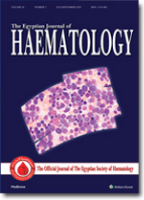
Egyptian Journal of Haematology
Advancing Hematology: Insights from Egypt and BeyondThe Egyptian Journal of Haematology, published by WOLTERS KLUWER MEDKNOW PUBLICATIONS, stands as a pivotal resource in the field of hematology, particularly within the context of Egypt and the broader Middle Eastern region. This journal is dedicated to disseminating high-quality research that explores the latest advancements in blood disorders, hematologic malignancies, and transfusion medicine. With a focus on original research, case studies, and reviews, it aims to provide a comprehensive platform for hematologists, researchers, and healthcare professionals to enhance their understanding and management of hematological conditions. Although it is not an open-access journal, the rigorous peer-review process ensures that only the most impactful studies are published, contributing to the journal's reputation in the academic community. The Egyptian Journal of Haematology serves as an essential tool for advancing knowledge, improving clinical outcomes, and fostering collaboration among experts in the field.
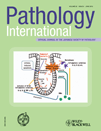
PATHOLOGY INTERNATIONAL
Elevating Research in Pathology and Forensic MedicinePATHOLOGY INTERNATIONAL, published by WILEY, stands as a distinguished journal in the field of pathology and forensic medicine, serving as an essential resource for researchers, clinicians, and students alike. With its ISSN 1320-5463 and E-ISSN 1440-1827, PATHOLOGY INTERNATIONAL has established itself since its inception in 1951, navigating through an evolving landscape in medical science with insights and breakthroughs up to 2024. It holds a commendable Q2 ranking in both the Medicine (miscellaneous) and Pathology and Forensic Medicine categories, indicating its robust influence and quality within these fields, as evidenced by its placement in the 70th percentile of Scopus rankings. While currently not an open-access journal, it provides access options that ensure valuable research remains available to the academic community. PATHOLOGY INTERNATIONAL commits to advancing the discipline through pioneering research articles, comprehensive reviews, and expert opinions that push the boundaries of understanding in pathology, thereby supporting the enhancement of diagnostic and therapeutic practices.

BLOOD REVIEWS
Unveiling the latest in blood research and treatment.BLOOD REVIEWS is a highly regarded journal published by Churchill Livingstone, specializing in the fields of Hematology and Oncology. With an impressive Q1 ranking in both disciplines and placing in the top 10% of its peer categories according to Scopus metrics, it provides an essential platform for the dissemination of cutting-edge research and reviews pertaining to blood disorders and cancer treatment. Since its inception in 1987 and continuing through 2024, the journal has established itself as a cornerstone for healthcare professionals, researchers, and students who seek to advance their understanding of hematologic and oncologic topics. While not an open-access journal, BLOOD REVIEWS retains a reputation for delivering high-quality, peer-reviewed articles that foster dialogue and innovation within the scientific community. For those in the United States and beyond, the journal serves as a vital resource, housed at the Journal Production Department in Edinburgh, Scotland, ensuring accessibility and a global reach in its critical academic contributions.
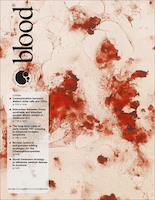
BLOOD
Illuminating Innovations in Hematology and Immunology.BLOOD, published by the American Society of Hematology, is a premier peer-reviewed journal in the fields of Biochemistry, Cell Biology, Hematology, and Immunology. With an impressive impact factor and ranking in the top quartiles (Q1) across multiple disciplines, BLOOD is essential reading for researchers and professionals seeking to stay updated on the latest advancements in hematology and related fields. The journal has been a cornerstone of hematological research since its inception in 1946, providing a platform for rigorous scientific inquiry and discourse. Its commitment to publishing high-quality original research, comprehensive reviews, and insightful editorials makes it a vital resource for students, practitioners, and scientists alike. By offering exceptional access to influential publications, BLOOD continues to shape the future of hematology and enhance understanding of blood-related disorders, marking its vital role in advancing both basic and clinical research.

Experimental Hematology & Oncology
Empowering Discovery in Hematology and OncologyExperimental Hematology & Oncology is a premier journal published by BMC, dedicated to advancing knowledge in the fields of hematology, oncology, and cancer research. Since its inception in 2012, this Open Access journal has emerged as a vital resource for researchers and healthcare professionals, fostering the dissemination of high-quality research that enhances our understanding of blood disorders and malignancies. With impressive rankings in Quarters 1 of key categories including Cancer Research, Hematology, and Oncology, it holds significant prestige, evidenced by its Scopus rankings: #42/404 in Medicine (Oncology) and #17/137 in Medicine (Hematology). The journal aims to publish cutting-edge studies, reviews, and perspectives that contribute to the evolution of therapeutic strategies and innovative treatment modalities. Researchers and practitioners alike will find this journal indispensable for staying at the forefront of breakthroughs in hematological and oncological research.
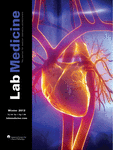
AMERICAN JOURNAL OF CLINICAL PATHOLOGY
Empowering Research in Pathology and MedicineThe American Journal of Clinical Pathology, published by Oxford University Press Inc, stands as a vital resource in the fields of pathology and clinical medicine. With a rich history dating back to 1945 and an impressive impact factor reflected in its Q1 ranking in Pathology and Forensic Medicine, this journal serves as a cornerstone for researchers and professionals seeking to advance their knowledge and practice. Covering a breadth of topics within the discipline, it is recognized in 2023 as ranked #24 out of 208 in its category, highlighting its esteemed reputation within the scientific community. Although the journal does not currently offer open access, its rigorous peer-reviewed articles and cutting-edge research make it an essential addition to any academic or clinical library. The ISSN for print version is 0002-9173, with an E-ISSN of 1943-7722 available for digital access. Researchers, students, and practitioners alike will benefit from its comprehensive scope and commitment to disseminating high-quality scientific inquiry.

Blood Research
Illuminating the Path in Blood Research and Patient CareBlood Research, published by SPRINGER, is a premier journal dedicated to the multifaceted realm of hematology, serving as a crucial platform for disseminating innovative research findings and advancements in the diagnosis and treatment of blood-related disorders. With an ISSN of 2287-979X and an E-ISSN of 2288-0011, this journal is recognized for its commitment to scholarly excellence and impact in the field, currently holding a reputable Q2 ranking in the Hematology category as per the 2023 metrics. The journal spans from 2013 to 2024, providing a broad archive of quality research that is vital for researchers, healthcare professionals, and students alike. Although it is not an Open Access journal, it offers insightful contributions that enhance the understanding of hematological science, fostering the exchange of knowledge crucial for advancing patient care and clinical practices globally. The journal’s performance is underscored by its Scopus ranking in the 46th percentile, reflecting its significant role in the ongoing discourse in hematology.
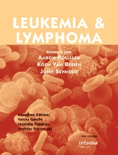
LEUKEMIA & LYMPHOMA
Empowering discoveries in hematology and oncology.LEUKEMIA & LYMPHOMA is a prestigious peer-reviewed journal published by Taylor & Francis Ltd, focusing on vital research in the fields of hematology, oncology, and cancer research. With an ISSN of 1042-8194 and an E-ISSN of 1029-2403, this journal is recognized for its high-quality and impactful contributions to understanding blood cancers, with a notable impact factor reflective of its influence. Since its inception in 1989, LEUKEMIA & LYMPHOMA has continuously provided a platform for researchers and professionals to disseminate their findings, fostering advancements in diagnostic, therapeutic, and clinical strategies related to leukemias and lymphomas. The journal ranks in the Q2 category for both Hematology and Oncology research categories as of 2023, underscoring its commitment to excellence. The journal is based in the United Kingdom and serves a global audience, making it an essential resource for those dedicated to improving outcomes for patients with hematological malignancies.
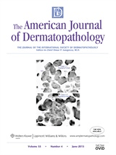
AMERICAN JOURNAL OF DERMATOPATHOLOGY
Exploring Innovations in DermatopathologyAMERICAN JOURNAL OF DERMATOPATHOLOGY, published by Lippincott Williams & Wilkins, is an essential resource for professionals and researchers engaged in the fields of dermatology, pathology, and forensic medicine. Established in 1979, the journal aims to disseminate cutting-edge research and advancements pertaining to the microscopic examination of skin disorders. With an esteemed impact factor that positions it well within the Q3 category of dermatology and pathology as of 2023, the journal ranks #81 out of 142 in dermatology and #130 out of 208 in pathology according to Scopus. Although it does not currently offer open access options, the journal provides valuable insights and substantial contributions to the understanding of dermatopathology, making it a vital tool for academics, clinicians, and students seeking to stay abreast of the latest findings and practices in the field. Its commitment to high-quality research continues to foster a deeper understanding of skin diseases, enhancing patient care and scientific inquiry alike.
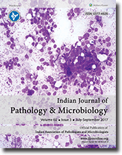
Indian Journal of Pathology and Microbiology
Illuminating the Frontiers of Pathological ResearchIndian Journal of Pathology and Microbiology, published by Wolters Kluwer Medknow Publications, is a distinguished open-access journal that has been fostering knowledge dissemination in the fields of pathology and microbiology since 2008. With an ISSN of 0377-4929 and E-ISSN 0974-5130, this journal serves as a critical resource for researchers and practitioners committed to advancing their understanding of medical sciences in India and beyond. Spanning decades of valuable research contributions since its establishment in 1972, it provides a platform for peer-reviewed articles that explore current trends and innovations in medicinal pathology and microbiological studies. Although it holds a Q4 ranking in categories such as medicine and microbiology, it maintains a notable Q3 classification in pathology and forensic medicine, highlighting its relevance to contemporary scientific discussions. Accessible freely to a global audience, the journal plays a pivotal role in enhancing scholarly communication and collaboration, making it an indispensable tool for students, professionals, and researchers alike aiming to contribute to this evolving discipline.